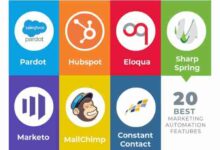How Artificial Intelligence Is Transforming Digital Marketing
Artificial Intelligence (AI) has become a game-changer in various industries, and one area where its impact is particularly significant is digital marketing. With its ability to analyze vast amounts of data, learn patterns, and make autonomous decisions, AI is revolutionizing the way businesses approach marketing strategies. From personalized customer experiences to predictive analytics, AI is transforming the digital marketing landscape in remarkable ways.
In this article, we will delve into the ways in which AI is reshaping digital marketing strategies and why businesses need to embrace this technology to stay ahead of the competition. Whether you are a marketer or a business owner, understanding the potential of AI in transforming digital marketing will help you leverage its power to drive growth and success.
Enhanced Customer Personalization
AI enables marketers to deliver highly personalized experiences to their customers. By analyzing customer data and behavior, AI algorithms can understand individual preferences, interests, and purchasing patterns. This allows marketers to create tailored content, recommend products or services, and deliver personalized offers and promotions.
Creating Tailored Content
AI algorithms can analyze vast amounts of data, including browsing history, purchase history, and social media activity, to understand each customer’s preferences and interests. With this information, marketers can create personalized content that resonates with their target audience. For example, an AI-powered recommendation engine can suggest relevant blog articles, videos, or product recommendations based on a customer’s previous interactions and preferences.
Recommendation Engines
One of the key applications of AI in digital marketing is the use of recommendation engines. These engines use machine learning algorithms to analyze customer data and provide personalized recommendations. For example, e-commerce websites often use recommendation engines to suggest products to customers based on their browsing history, purchase history, and preferences. This not only enhances the customer experience but also increases the likelihood of conversions and repeat purchases.
Personalized Offers and Promotions
AI-powered systems can analyze customer data to identify patterns and trends, enabling marketers to deliver personalized offers and promotions. By understanding each customer’s preferences, marketers can tailor their offers to match their individual needs and increase the chances of conversion. For example, an AI system can identify customers who have shown interest in a particular product category and send them exclusive discounts or promotions related to that category.
Advanced Data Analytics
AI-powered analytics tools can process and analyze vast amounts of data quickly and accurately. This allows marketers to gain valuable insights into customer behavior, market trends, and campaign performance. With AI, businesses can make data-driven decisions, identify new opportunities, and optimize their marketing strategies for better results.
Processing and Analyzing Big Data
One of the biggest challenges in digital marketing is processing and analyzing large volumes of data. AI-powered analytics tools can handle this task efficiently, enabling marketers to extract actionable insights from their data. By analyzing customer behavior, demographics, and interactions with marketing campaigns, AI algorithms can identify patterns and trends that humans may miss. This allows marketers to make data-driven decisions and optimize their strategies accordingly.
Real-Time Analytics
AI-powered analytics tools can provide real-time insights into campaign performance, allowing marketers to make timely adjustments. By monitoring key metrics such as click-through rates, conversion rates, and engagement levels in real-time, marketers can identify underperforming campaigns or opportunities for improvement. This agility and responsiveness are crucial in today’s fast-paced digital landscape.
Identifying New Opportunities
AI algorithms can analyze market trends, competitor data, and customer behavior to identify new opportunities for business growth. By spotting emerging trends or gaps in the market, marketers can develop new products or services that cater to customer needs. AI-powered tools can also analyze customer feedback and sentiment to identify areas for improvement or innovation.
Improved Customer Service
AI-powered chatbots and virtual assistants are transforming customer service by providing instant and personalized support. These AI-powered solutions can handle customer inquiries, provide product recommendations, and even process transactions. By automating customer support, businesses can enhance customer satisfaction, reduce response times, and improve overall customer experience.
24/7 Availability
AI-powered chatbots and virtual assistants are available round the clock, providing instant support to customers at any time. This eliminates the need for customers to wait for a human agent to assist them, resulting in faster response times and improved customer satisfaction. Whether it’s answering frequently asked questions or resolving simple issues, AI-powered chatbots can handle a wide range of customer inquiries efficiently.
Personalized Recommendations and Assistance
AI-powered chatbots can analyze customer data to provide personalized product recommendations or assistance. By understanding a customer’s preferences, purchase history, and browsing behavior, chatbots can suggest relevant products or services that match their needs. This level of personalization helps customers find what they are looking for quickly and enhances their overall shopping experience.
Seamless Integration with Human Agents
AI-powered chatbots can seamlessly transfer conversations to human agents when more complex issues arise. This ensures that customers receive the appropriate level of assistance and support. By automating routine tasks and handling simple inquiries, AI-powered chatbots free up human agents’ time to focus on more complex or specialized customer needs, improving overall efficiency and productivity.
Enhanced Email Marketing
AI can optimize email marketing campaigns by analyzing customer behavior and preferences. By leveraging AI algorithms, marketers can send personalized and targeted emails at the right time, resulting in higher open rates, click-through rates, and conversions. AI can also help automate email campaigns, allowing marketers to focus on creating compelling content.
Personalized Email Content
AI algorithms can analyze customer data to create personalized email content that resonates with each recipient. By considering factors such as past purchase history, browsing behavior, and demographic information, AI can tailor email content to match the interests and preferences of individual customers. This level of personalization increases the likelihood of engagement and conversion.
Optimal Timing and Frequency
AI algorithms can analyze customer behavior to determine the optimal timing and frequency for sending emails. By considering factors such as open rates, click-through rates, and conversion rates, AI can identify the best time to send emails to maximize engagement. AI can also help prevent email fatigue by determining the appropriate frequency of email communication to avoid overwhelming customers.
Automated Email Campaigns
AI-powered tools can automate various aspects of email marketing campaigns, saving marketers time and effort. For example, AI can automatically segment email lists based on customer behavior or demographics, ensuring that each recipient receives relevant content. AI can also automate the creation of personalized email templates or the scheduling of emails based on specific triggers or events, such as abandoned carts or birthdays.
Predictive Analytics
AI’s predictive analytics capabilities enable marketers to anticipate customer needs and behaviors. By analyzing historical data and patterns, AI algorithms can predict future trends, customer preferences, and buying habits. This empowers marketers to make proactive decisions, optimize marketing campaigns, and deliver personalized experiences that resonate with their target audience.
Forecasting Customer Behavior
AI algorithms can analyze historical customer data to forecast future behavior and preferences. By identifying patterns and trends in past interactions, AI can predict the likelihood of a customer making a purchase, churning, or engaging with specific marketing campaigns. This helps marketers anticipate customer needs and tailor their strategies accordingly, increasing the effectiveness of their marketing efforts.
Anticipating Market Trends
AI-powered predictive analytics can also analyze market data and external factors to anticipate trends and changes in consumer behavior. By monitoring social media conversations, news articles, and industry reports, AI algorithms can identify emerging trends or shifts in customer preferences. This enables marketers to stay ahead of the competition and capitalize on new opportunities before they become mainstream.
Personalized Product Recommendations
AI algorithms can leverage predictive analytics to provide personalized product recommendations based on individual customer preferences and buying habits. By analyzing historical data and comparing it to the behavior of similar customers, AI can suggest products or services that are likely to resonate with each customer. This level of personalization enhances the customer experience and increases the chances of conversion.
Streamlined Content Creation
AI-powered tools can assist marketers in creating high-quality content quickly and efficiently. From generating blog post ideas to writing product descriptions, AI algorithms can automate content creation processes, saving time and effort. By leveraging AI, marketers can focus on strategy and creativity while AI takes care of the repetitive tasks.
Generating Content Ideas
AI-powered tools can analyze market trends, customer behavior, and competitor data to generate content ideas. By identifying popular topics or gaps in the market, AI algorithms can suggest relevant and engaging topics for blog posts, social media content, or videos. This helps marketers stay up-to-date with the latest trends and create content that resonates with their target audience.
Automating Content Writing
AI algorithms can generate content quickly and efficiently, freeing up marketers’ time for more strategic tasks. For example, AI-powered tools can write product descriptions, social media posts, or email newsletters based on provided guidelines or templates. This automation streamlines the content creation process and ensures consistency in tone and style across different platforms.
Optimizing Content for SEOAI-powered tools can analyze keywords, search trends, and competitor data to optimize content for search engines. By suggesting relevant keywords, optimizing meta tags, and analyzing content structure, AI algorithms can help marketers improve their website’s visibility in search engine results. This, in turn, increases organic traffic and enhances the overall effectiveness of content marketing efforts.
Improving Content Performance
AI-powered tools can analyze content performance metrics such as engagement, click-through rates, and conversions to identify areas for improvement. By providing actionable insights and recommendations, AI algorithms can help marketers optimize their content to drive better results. This includes A/B testing headlines, adjusting content length, or experimenting with different formats to maximize audience engagement and conversion rates.
Content Curation
AI-powered content curation tools can analyze vast amounts of data to curate relevant and high-quality content for marketers. By understanding the interests and preferences of their target audience, AI algorithms can suggest articles, videos, or social media posts that are likely to resonate with their audience. This helps marketers stay informed, share valuable content, and build authority within their niche.
Improved Ad Targeting
AI algorithms can analyze vast amounts of data to identify the most relevant audience segments for targeted advertising campaigns. By understanding customer demographics, interests, and purchase history, AI can optimize ad targeting and deliver personalized ads that resonate with the target audience. This increases ad effectiveness, reduces wasteful spending, and enhances overall campaign performance.
Segmenting the Audience
AI algorithms can segment audiences based on various criteria, such as demographics, interests, or behavior. By analyzing customer data, AI can identify specific segments that are most likely to respond positively to an ad campaign. This allows marketers to create personalized ad experiences that address the unique needs and preferences of each segment, increasing the likelihood of engagement and conversion.
Dynamic Ad Optimization
AI-powered ad platforms can automatically optimize ad creatives, placements, and targeting based on real-time data. By analyzing performance metrics such as click-through rates, conversion rates, and engagement levels, AI algorithms can make data-driven decisions to improve ad performance. This includes adjusting ad copy, images, or targeting settings to maximize the return on ad spend and achieve campaign objectives.
Personalized Ad Experiences
AI algorithms can analyze customer data to deliver personalized ad experiences that resonate with each individual. By considering factors such as browsing history, purchase behavior, and demographic information, AI can tailor ad content, messaging, and offers to match the preferences and interests of each customer. This level of personalization increases the chances of engagement and conversion, ultimately driving better campaign results.
Voice Search Optimization
With the rise of voice assistants like Siri, Alexa, and Google Assistant, optimizing for voice search has become crucial. AI-powered voice recognition technology enables businesses to understand natural language queries and provide accurate and relevant responses. By optimizing their content for voice search, businesses can improve their visibility and reach a wider audience.
Understanding Natural Language Queries
AI-powered voice recognition technology can understand and interpret natural language queries, allowing businesses to provide accurate and relevant responses. By analyzing speech patterns, context, and intent, AI algorithms can extract the meaning behind voice queries and deliver the most appropriate results. This enhances the user experience and increases the chances of voice search users engaging with businesses.
Optimizing Content for Voice Search
AI algorithms can analyze voice search data to identify common phrases, questions, and patterns used by voice search users. By incorporating these insights into their content strategy, businesses can optimize their website content, blog posts, and FAQ sections to better match voice search queries. This includes using conversational language, answering specific questions, and providing concise and relevant information.
Local Voice Search Optimization
AI-powered voice recognition technology can understand and interpret location-based queries, enabling businesses to optimize their content for local voice search. By including relevant location information, such as city names or landmarks, businesses can increase their visibility in local voice search results. This is especially important for businesses with physical locations, as it helps attract nearby customers looking for products or services in their vicinity.
Social Media Management
AI can simplify social media management by automating tasks such as content scheduling, sentiment analysis, and social listening. AI-powered tools can analyze social media conversations, identify trends, and provide actionable insights. This helps marketers optimize their social media strategies, engage with their audience more effectively, and drive better results.
Automated Content Scheduling
AI-powered social media management tools can schedule content to be posted at optimal times based on audience behavior and engagement patterns. By analyzing historical data, AI algorithms can determine the most active times on social media platforms, ensuring that content reaches the maximum number of followers. This automation saves marketers time and effort while maximizing the impact of their social media posts.
Sentiment Analysis
AI algorithms can analyze social media conversations to determine the sentiment and emotions expressed by users. By monitoring mentions, comments, and hashtags related to a brand or campaign, AI can identify positive or negative sentiment trends. This helps marketers gauge the success of their campaigns, identify potential issues or crises, and take appropriate actions to maintain a positive brand image.
Social Listening and Trend Identification
AI-powered social listening tools can monitor social media platforms for mentions, keywords, or hashtags related to a brand or industry. By analyzing this data, AI algorithms can identify emerging trends, popular topics, or customer pain points. This helps marketers stay informed, identify opportunities for engagement, and create content that resonates with their target audience. Additionally, AI can provide actionable insights and recommendations based on social media data to optimize marketing strategies.
Fraud Detection and Prevention
AI algorithms can detect and prevent fraudulent activities such as click fraud and ad fraud. By analyzing user behavior and patterns, AI can identify suspicious activities and take proactive measures to prevent fraudulent actions. This helps businesses maintain the integrity of their marketing campaigns, protect their budgets, and ensure fair competition.
Click Fraud Detection
AI algorithms can analyze click patterns, IP addresses, and user behavior to identify click fraud in digital advertising campaigns. By detecting abnormal click activity or patterns that indicate fraudulent behavior, AI can prevent advertisers from paying for invalid clicks. This protects the integrity of advertising campaigns and ensures that budgets are spent effectively.
Ad Fraud Prevention
AI algorithms can analyze ad impressions, engagement metrics, and conversion data to identify ad fraud. By monitoring for suspicious activity such as bot traffic, ad stacking, or click injection, AI can detect and prevent fraudulent actions that may inflate ad performance metrics. This ensures that advertisers receive accurate data and fair competition in the digital advertising ecosystem.
User Behavior Analysis
AI algorithms can analyze user behavior and patterns to identify anomalies or suspicious activities that may indicate fraudulent behavior. By considering factors such as session duration, click-through rates, or conversion rates, AI can flag potential fraudulent activities and take proactive measures to prevent further harm. This helps businesses maintain the integrity of their marketing campaigns and protect their online assets.
In conclusion, artificial intelligence is transforming digital marketing in unprecedented ways. From enhanced customer personalization to advanced data analytics, AI empowers marketers to make data-driven decisions, optimize campaigns, and deliver personalized experiences. By embracing AI, businesses can stay competitive in the ever-evolving digital landscape and unlock new opportunities for growth and success.


